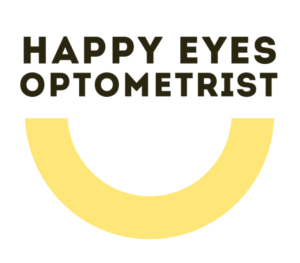Protect your sight with early detection
Glaucoma is a group of eye diseases that damage the optic nerve—often with no warning signs. Most people don’t notice any symptoms until significant, permanent vision loss has already occurred. That’s why regular optometric eye exams are essential.

Why glaucoma testing matters
- Usually no symptoms in early and moderate stages
- Vision loss is permanent once nerve fibres are damaged
- Early detection + monitoring helps preserve vision for the long term
How we diagnose & monitor glaucoma at Happy Eyes
1) OCT scans (RNFL & GCL analysis)
We use Optical Coherence Tomography (OCT) to measure the Retinal Nerve Fibre Layer (RNFL) and Ganglion Cell Layer (GCL). These layers are crucial for vision and are often affected before visual field changes appear.
- Baseline OCT at your first visit
- Year-on-year comparisons to track trends and detect subtle change
- Clear explanations of your reports
2) Visual field testing
We perform automated visual field tests to map your peripheral (side) vision. This helps detect functional changes and guides treatment decisions.
3) Comprehensive clinical exam
- Eye pressure (IOP) measurement
- Optic nerve head assessment
- Corneal thickness (if indicated)
- Family and medical history review
- Personalised risk profile and follow-up schedule
If glaucoma is suspected or confirmed, we’ll coordinate care with trusted ophthalmologists while continuing shared monitoring in our clinic.
Who is at higher risk?
- Family history of glaucoma
- Age over 40 (risk increases with age)
- High eye pressure (IOP)
- Thinner corneas
- Long-term steroid use or certain systemic conditions
Even without risk factors, routine eye tests are important—glaucoma is often silent.
What to expect at your appointment
- History & vision check
- OCT scan (RNFL/GCL baseline or comparison to last year)
- Eye pressure & optic nerve exam
- Visual field test (as indicated)
- Results & plan: monitoring interval, lifestyle tips, and referral if needed
FAQs
Will I notice glaucoma early on?
Usually not. Glaucoma is typically symptom-free until advanced. Only proper eye tests can detect it.
How often should I be tested?
Most adults benefit from an eye exam every 1–2 years; more often if you’re at higher risk or already being monitored.
If I have glaucoma, can you treat it?
Glaucoma is usually managed with prescription drops, laser, or surgery overseen by an ophthalmologist. We provide ongoing testing (OCT, visual fields) and co-management to protect your vision.
Take the preventive step today
An exam now can make the difference years later. If it’s been a while—or you have risk factors—book a glaucoma check.
